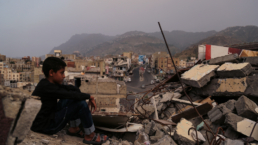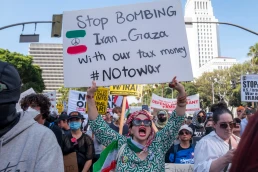Proponents have passed similar bills before, but this time they’ll have to contend with a White House striving to rekindle relations with Saudi Arabia.
By Sara Sirota, The Intercept
More than seven years have passed since Yemen’s Houthi rebels leveraged popular frustration over fuel prices to oust the government of President Abdrabbuh Mansur Hadi. That was a troubling development for Saudi Arabia, which had allied with the overthrown leadership to secure access to a key oil shipping lane off Yemen’s coast. The prospect that a movement purportedly backed by regional foe Iran would control this waterway was unconscionable, so the oil kingdom convened an international coalition, under the leadership of then-Saudi Defense Minister Mohammed bin Salman, now the crown prince, that could suffocate the insurgents. With the support of the United States, Saudi Arabia established a devastating port blockade that slashed the flow of commercial and humanitarian goods into Yemen and littered the country with bombs that have killed countless civilians.
During the Trump administration, some Democrats, joined by a handful of Republicans, fought to end the U.S. bomb sales, intelligence support, and warplane refueling that made the Saudi intervention possible. But with a Riyadh-friendly president in the White House, their efforts never had a plausible chance of actually forcing the kingdom to withdraw. Democrats at the time didn’t bear responsibility for managing relations with a major weapons customer and oil producer that helped keep gas prices low at home. In early 2019, when majorities in both the House of Representatives and Senate for the first time in history invoked the 1973 War Powers Resolution to end U.S. involvement, Saudi Arabia could rely on former President Donald Trump’s veto.

So the war dragged on. President Joe Biden adjusted U.S. policy when he entered office by demanding an end to “offensive” support, but this didn’t have a material impact for Yemenis trapped by the blockade and Saudi air raids supporting it. In November, the United Nations estimated that 377,000 Yemenis would be dead by the end of 2021, 70 percent of whom would be children, many as a result of starvation and disease. According to the World Food Programme, more than 17 million Yemenis are battling food insecurity, and that figure is expected to rise to 19 million, or nearly one-third of the population, by December 2022. Two months ago, the U.N. brokered a cease-fire between Saudi Arabia and the Houthis that gave the population some respite, but it’s scheduled to end this week. Numerous aid groups are calling for an extension.
Recent Posts
Is A Citizens United 2.0 Right Around The Corner?
July 15, 2025
Take Action Now Is it possible for American democracy to be further degraded by the influence of billionaires? Thanks to champion of the working…
U.S. Leaders Gave Up On Diplomacy With Iran. We Must Make Them Return To It.
July 15, 2025
Take Action Now Building an antiwar movement means preventing the systemic U.S. aggression that creates the conditions for war.By Hanieh Jodat,…
What To Do When You See ICE In Your Neighborhood
July 14, 2025
Take Action Now How can you deter the Trump administration’s immigrant deportation machine when it pops up in your community? Follow these…
ICE Campaign Of Violence Will Lead To More Deaths
July 14, 2025
Take Action Now Jaime Alanis’s death shows the horrific consequences of a secret police force behaving with utter impunity.By Natasha Lennard, The…




